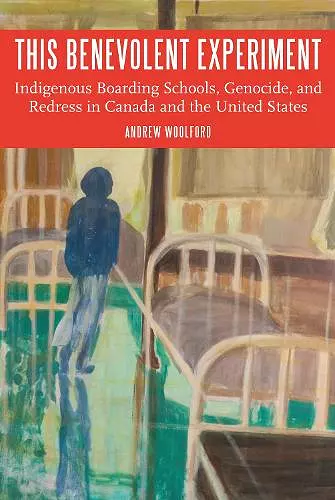This Benevolent Experiment
Indigenous Boarding Schools, Genocide, and Redress in Canada and the United States
Format:Paperback
Publisher:University of Nebraska Press
Published:1st Sep '18
Currently unavailable, and unfortunately no date known when it will be back

AChoice Outstanding Academic Title, 2017
This important book, which students, scholars, and policy makers in the U.S. and Canada should read, is a testament to the quality of the work and the still limited understanding of its subject in both countries.-C. R. King, Choice
At the end of the nineteenth century, Indigenous boarding schools were touted as the means for solving the “Indian problem” in both the United States and Canada. With the goal of permanently transforming Indigenous young people into Europeanized colonial subjects, the schools were ultimately a means for eliminating Indigenous communities as obstacles to land acquisition, resource extraction, and nation-building. Andrew Woolford analyzes the formulation of the “Indian problem” as a policy concern in the United States and Canada and examines how the “solution” of Indigenous boarding schools was implemented in Manitoba and New Mexico through complex chains that included multiple government offices with a variety of staffs, Indigenous peoples, and even nonhuman actors such as poverty, disease, and space. The genocidal project inherent in these boarding schools, however, did not unfold in either nation without diversion, resistance, and unintended consequences.
Inspired by the signing of the 2007 Indian Residential School Settlement Agreement in Canada, which provided a truth and reconciliation commission and compensation for survivors of residential schools, This Benevolent Experimentoffers a multilayered, comparative analysis of Indigenous boarding schools in the United States and Canada. Because of differing historical, political, and structural influences, the two countries have arrived at two very different responses to the harm caused by assimilative education.
"[This Benevolent Experiment] is well written, intelligently organized, meticulously researched, and offers original content. Woolford provides an important addition to the growing and rich literature about American Indian genocide and boarding schools."-Clifford E. Trafzer, American Historical Review "This Benevolent Experiment is a must-read for the experts and students of North American history and Native Americans alike."-Arif Jamal, Washington Book Review "This important book, which students, scholars, and policy makers in the U.S. and Canada should read, is a testament to the quality of the work and the still limited understanding of its subject in both countries."-C. R. King, CHOICE "Andrew Woolford's contribution to the field of residential school studies is fascinating. . . . This important work deserves to be read and debated in both countries."-Jim Mochoruk, South Dakota State Historical Society "[This Benevolent Experiment] is a genuine contribution to the literature and will remain for years to come a major source for understanding this tragic, but nonetheless fascinating, chapter in indigenous-colonial settler relations."-David Wallace Adams, American Indian Culture and Research Journal "Scholars of indigenous boarding schools will find Woolford's book a valuable tool in analyzing and describing the destructive power of these institutions."-John Gram, Western Historical Quarterly "An excellent offering for scholars."-Roundup Magazine “Andrew Woolford’s outstanding book offers fresh contributions to the field of Indigenous and settler colonial studies. His comparison of the Indian boarding schools in the United States with their Canadian counterparts yields new insights into both. He provides a sophisticated and probing analysis of whether these schools constituted genocidal policies and practices. This is a top-notch piece of scholarship that should enrich our scholarly-and national-debates for decades to come.”-Margaret Jacobs, author of White Mother to a Dark Race and A Generation Removed
ISBN: 9781496203861
Dimensions: unknown
Weight: unknown
450 pages